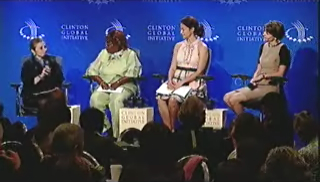
For all the talk about the historic nature of the Clinton (woman!) and Obama (Black!) campaigns that’s gone on in the mainstream media for the past year, you might not have any idea that a third, equally unprecedented ticket was being run: Cynthia McKinney and Rosa Clemente, the presidential and vice-presidential nominees of the Green Party. This is the first all women of color presidential ticket in the history of the United States. Now, I understand that a nomination’s historical importance and newsworthiness tends to be defined by the likelihood of its success – or, as is often the case, by the degree to which people decide to blame the Democratic party’s failures on the Greens. Yet one would hope that in between all of the celebrity gossip and other tripe that makes it onto the news regularly, the mainstream media would find a little more time to devote to a presidential ticket that is unique not only for its makeup but also for the platform it’s running on, a platform that offers a radically different choice from the rightly-named corporate parties that dominate the politics of this nation.
But predictably, the mainstream media has almost completely ignored the McKinney/Clemente ticket. When they won the Green nomination, there were a few articles here, a few news reports here, most of them focusing more on the candidates’ chances of being “spoilers” in the upcoming election rather than focusing on, you know, their positions or platform or qualifications, all of which the MSM apparently deems irrelevant. Most of what I’ve heard about McKinney and Clemente has come from the blogosphere, and even here, coverage is slim. The majority of the mentions I’ve seen have been about McKinney being a possible alternative vote for Clinton supporters who don’t want to vote for Obama, and even there, McKinney is discussed less often than John McCain as the alternate vote. Even on Feministe (if my memory and our search tool are working properly), McKinney’s candidacy hasn’t been mentioned in an actual post, only in the comments.
Now I get that this lack of coverage is to be expected, especially if you’re measuring a candidate’s importance or significance by their likelihood to win come November. McKinney and Clemente won’t be in the White House come January, and I’m sure they both understand that. However, the actual presidency is not the only thing at stake here, especially for the Greens and more generally for the future of third parties in this country. In an interview with Newsweek (subtitled “Will a third-party candidate be a ‘spoiler’?”), McKinney discusses another important and far more feasible goal (emphasis mine):
There are currently about 200 members of the Green Party who are elected officials. These are mostly local elections. The Green Party does not yet have representation on the federal level, but it’s quite a successful “minor” party. With 5 percent of the electorate, it can move from minor party status to major party status [and qualify the Green Party for federal funds]. So our goal is to get onto as many ballots as we can, since then achieving a 5 percent goal becomes possible. When I got to Washington D.C., I realized that public policy was made around the table. The 5 percent puts another seat at the table.
As Obama continues to hedge, flip-flop, and trend right on a variety of issues, and as McCain continues to be his usually sucky self, it becomes clearer and clearer that another seat at the table, a true alternative to corporate politics as usual, is desperately needed. And while even 5 percent of the vote is an uphill battle for McKinney, Clemente, and the rest of the Greens, it isn’t impossible. Such a victory would be huge, a major step in breaking this country away from the two-party system that time and time again shows itself to be severely lacking for people who believe in true peace and true justice.
But who’s gonna vote for them? Continue reading ‘The women still in the race’
 Yesterday I watched the live video feed of a Global Health working session at the Clinton Global Initiative Annual Meeting. (The press can’t attend the actual working sessions, so we had to sit and watch from the press room.) A bit of background – at the CGI Annual Meetings, government, corporate, and NGO leaders get together to discuss major world issues and figure out ways to tackle them. Each day they break out into working sessions, each one devoted to one of this year’s four focus areas: Poverty Alleviation, Energy and Climate Change, Education, and Global Health. This particular Global Health working session was entitled “Healthy Transitions for Adolescent Girls,” which immediately jumped out at me as a topic of great interest, both personally and for folks at Feministe.
Yesterday I watched the live video feed of a Global Health working session at the Clinton Global Initiative Annual Meeting. (The press can’t attend the actual working sessions, so we had to sit and watch from the press room.) A bit of background – at the CGI Annual Meetings, government, corporate, and NGO leaders get together to discuss major world issues and figure out ways to tackle them. Each day they break out into working sessions, each one devoted to one of this year’s four focus areas: Poverty Alleviation, Energy and Climate Change, Education, and Global Health. This particular Global Health working session was entitled “Healthy Transitions for Adolescent Girls,” which immediately jumped out at me as a topic of great interest, both personally and for folks at Feministe.


